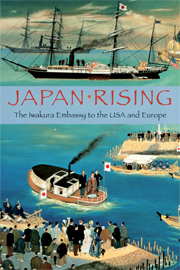Book contents
- Frontmatter
- Contents
- Introduction by Ian Nish
- Note on the Text
- VOLUME I THE UNITED STATES OF AMERICA
- VOLUME II BRITAIN
- VOLUME III CONTINENTAL EUROPE, 1
- VOLUME IV CONTINENTAL EUROPE, 2
- VOLUME V CONTINENTAL EUROPE, 3; AND THE VOYAGE HOME
- 82 The Vienna Universal Exposition, 1
- 83 The Vienna Universal Exposition, 2
- 84 A Record of Switzerland
- 85 Switzerland's Mountain Scenery
- 86 A Record of Berne and Geneva
- 87 A Record of Lyons and Marseilles
- 88 Spain and Portugal
- 89 Political Practices and Customs in Europe
- 90 European Geography and Transportation
- 91 The Climate and Agriculture of Europe
- 92 European Industry
- 93 European Commercial Enterprise
- 94 The Voyage Through the Mediterranean
- 95 The Voyage Through the Red Sea
- 96 The Voyage Through the Arabian Sea
- 97 A Record of the Island of Ceylon
- 98 The Voyage Through the Bay of Bengal
- 99 The Voyage Through the China Sea
- 100 A Record of Hong Kong and Shanghai
- Index
93 - European Commercial Enterprise
Published online by Cambridge University Press: 04 August 2010
- Frontmatter
- Contents
- Introduction by Ian Nish
- Note on the Text
- VOLUME I THE UNITED STATES OF AMERICA
- VOLUME II BRITAIN
- VOLUME III CONTINENTAL EUROPE, 1
- VOLUME IV CONTINENTAL EUROPE, 2
- VOLUME V CONTINENTAL EUROPE, 3; AND THE VOYAGE HOME
- 82 The Vienna Universal Exposition, 1
- 83 The Vienna Universal Exposition, 2
- 84 A Record of Switzerland
- 85 Switzerland's Mountain Scenery
- 86 A Record of Berne and Geneva
- 87 A Record of Lyons and Marseilles
- 88 Spain and Portugal
- 89 Political Practices and Customs in Europe
- 90 European Geography and Transportation
- 91 The Climate and Agriculture of Europe
- 92 European Industry
- 93 European Commercial Enterprise
- 94 The Voyage Through the Mediterranean
- 95 The Voyage Through the Red Sea
- 96 The Voyage Through the Arabian Sea
- 97 A Record of the Island of Ceylon
- 98 The Voyage Through the Bay of Bengal
- 99 The Voyage Through the China Sea
- 100 A Record of Hong Kong and Shanghai
- Index
Summary
Individually, Europeans fall far short of the Japanese in craftsmanship. Yet how the industrial arts flourish among them, and what vast gains in wealth and power they have made! Because they are no more able to depend on their native ingenuity than on their infertile soil, they make every effort to conquer nature by thoroughly investigating its mechanisms, by unremitting labour, and by close co-operation with one another. Their capacity for investigation leads to advances in knowledge, their capacity for hard work leads to the invention of machines, and their capacity for co-operation brings prosperity in trade. It is the combination of these qualities which has produced the flourishing civilisation we see today. An examination of the situation in Europe shows that while people in the East have developed agriculture and manufacturing through ‘practical’ experience, people in the West have developed agriculture and manufacturing through ‘theoretical’ study. Thus, their technology cannot escape a dependence on machines. We should not, therefore, be overawed by their engineering feats. What should give us the greatest cause to fear arises from their capacity for co-operation and their untiring attention to the minutiae of trade. They always obtain the best possible prices for the goods which their nations produce, and their commerce is like an army on the march. They cannot rely on nature, so they make human co-operation their chief principle. It is in commerce that Europe can best serve as an example to the world.
- Type
- Chapter
- Information
- Japan RisingThe Iwakura Embassy to the USA and Europe, pp. 482 - 486Publisher: Cambridge University PressPrint publication year: 2009



